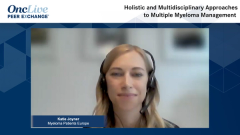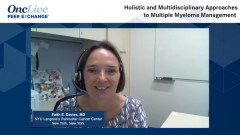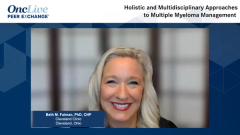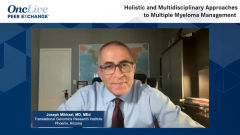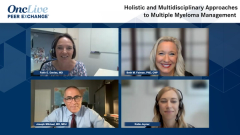
Treatment Considerations for Patients with Newly Diagnosed Multiple Myeloma
Panelists share a brief discussion on the current treatment armamentarium available to patients with newly diagnosed multiple myeloma.
Episodes in this series

Transcript:
Faith E. Davies, MD: I'd like to talk about treatment because essentially, we are moving into an era now where [we've] got so many different treatments and different treatment approaches that...we…need to think about our myeloma patient both at diagnosis and then potentially maintenance, relapse, and so on and so forth. So, I guess I'll start with Joe. What are some of our considerations for a newly diagnosed myeloma patient?
Joseph Mikhael, MD, MEd: Sometimes we get so excited about the new things that are coming in myeloma, which is true and correct, and typically they come in the relapsed setting. But we're actually really seeing a lot of this now influence our frontline therapy. And I would say right now…[with] our approach and thinking in frontline therapy, although we still are making a distinction, if you will, of patients [who] are truly transplant eligible or transplant ineligible, often the treatment…it is still very, very similar. And...the essence of what we've learned is that introducing multidrug combinations in frontline therapy is definitely having a positive impact, where we can use even lower doses, but still in combination for patients who may not be fit enough to undergo a stem cell transplant.
And for those patients who are going to undergo a transplant, [they’re] typically now moving from triplets…to quadruplets prior to the transplant, undergoing a transplant, [and receiving] maintenance therapy thereafter. And we're finding that patients, whether they've had a transplant or not, are having significantly better outcomes now, where we're just expecting people to be in remission for those first 4 or 5 years. With the exception, as you mentioned, of those highest-risk patients [where] still, tragically, we still have a lot of challenge in controlling their disease. But this is the…approach and the move …that we're seeing within the myeloma community, and this is now being reflected in our IMWG [International Myeloma Working Group] guidelines. We're seeing it in the US, here in the NCCN guidelines. And then the more specific guidelines that we see used in different centers, such as…at Mayo Clinic or at Emory or in various groups, we're definitely seeing this trend where we're moving from triplets to quadruplets. And for transplant-ineligible patients, we're definitely using triplets and now testing quadruplets in that same setting.
Faith E. Davies, MD: Moving to Beth, obviously…we've talked about how the landscape is moving. What do you think some of the barriers are for patients…both at diagnosis and as they go through their myeloma journey?
Beth M. Faiman, PhD, CNP: This is such an important question. I look at patients with newly diagnosed myeloma and I think to myself, okay, what is their fitness? What is their frailty? What are their goals of care? Are they working full time, and they have to take care of 4 children and they're the breadwinner of the family? Maybe there [are] geographical constraints. We've talked briefly about this…and Katie can address this topic as well in her region, but there are so many different factors to consider. So, while 3 or 4 drugs upfront are what's recommended for patients with myeloma, if somebody is not very fit, they're [frailer]…maybe we're going to try to recommend…a lighter regimen, and not necessarily more aggressive.
The newer therapies we'll talk about later on, the landscape of the newer therapies. But sometimes [it’s]…what [you are] willing to accept in terms of side effects or toxicities, the short-term or the long-term benefit. So, I have this whole shared decision-making discussion with patients, and we'll talk about that more…a little bit down the road, how you make those treatment decisions and what the discussions look like. But that's…where I'm at with the treatment sequencing. We just don't…have a CHOP-like regimen, right, Dr Joe? We're still looking for that…lymphoma-like regimen that everybody can respond to.
Transcript is AI-generated and edited for clarity and readability.


